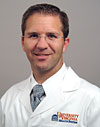Ever wonder what your doctor or health provider does outside the exam room? Our 7 Quick Questions series gives you a personal glimpse into the people of UVA.

Todd W. Bauer, MD is associate professor of surgery in UVA’s Division of Surgical Oncology.
What did you want to be when you were little?
I have always wanted to be a surgeon. My father is a general surgeon and still practicing today (for the past 10 years as a breast surgeon). Ever since I could walk I can remember going into the hospital with my father to “make rounds” on his patients – he worked long hours and this was an opportunity for me to spend a little more time with him. It was inspiring to me how much he loved his work, and how rewarding it was for him to be helping people in that way that he did, and how his patients felt about him.
What’s your favorite place to travel?
Stone Harbor, New Jersey. I grew up going to the beach in Stone Harbor and my family still vacations there every summer.
What’s one thing you always have in your fridge?
Chocolate.
What’s the most unhealthy thing you eat?
Pizza.
What’s the most exciting thing/research happening in your field right now?
Understanding the molecular biology of pancreatic cancer and how we can derive personalized therapies.
Why cancer?
Cancer is a difficult challenge, and with great challenges come great rewards. Cancer affects men and women and people of all ages. The genetic and molecular complexity of cancer makes the field incredibly challenging from a research perspective, and I like a challenge. From a surgical perspective, it is very rewarding to remove a patient’s cancer and give the patient (and care team) hope – and hope is probably the best gift any of us can have.
Who’s your inspiration/hero?
My father has always been my inspiration because of his unwavering devotion to his patients and to the field of medicine – even today at the age of 75.
Are you worried about your pancreatic cancer risk? Our High-Risk Pancreatic Cancer Clinic screens patients with a family history or pancreatic cysts.
In your clinical trials, do you ever treat patients with cancer using alternative treatments that would not include some form of chemotherapy? My son has stage 4, metastasized, colorectal cancer with ascites in the peritoneum. Two oncologist have just said that there is no cure, and there is nothing they can do for him. One oncologist said he would try to make him feel better and that “Fol Fox might help” and mentioned others. As chemotherapy destroys the whole immune system if it does kill or shrink tumor cells, how could there a positive outcome? Is it true that doctors are not allowed to use any method to help a person with cancer that is not approved by the FDA? The FDA only approves chemicals for treatment and ultimately runs doctors who try to help patients unwilling to accept those chemicals out of the country. Will you explain?
I was diagnosed with stage 1B pancreatic cancer (adenocarcinoma of the head of the pancreas, with a 4cm tumor and Ca19.9 of 3650). I had a Whipple surgery at UVA in July 2015, then followed that with 6 mo of chemo (gemcitabine) once a week x 3 weeks for 6 months). This July I will be 4 yrs out from surgery. I see my oncologist now every 6 months, plus CT of chest, abdomen and pelvis, plus lab work, including the CA19.9 –The pancreatic cancer tumor marker. I feel incredibly well, tons of energy, but in spite of nothing but good reports since surgery, that little black cloud over my head never quite goes away. And the closer I get to the 5 yr survival rate, the more my anxiety level goes up. I’m 69 yrs old so those little aches and pains that comes along with age also makes one wonder if It’s a “normal” sign of aging, or the cancer back and in a new place in my body. I just wish the survival rate for this cancer was a little more encouraging and hopeful. I really try to stay positive, but cancer is an uninvited guest who just never really leaves its host feeling 100% “safe”.
My surgeon was Dr Reid Adams. He and the rest of his team were great and I truly felt I was being treated at the best place possible. (I had moved to Lynchburg from the Pacific Northwest just 8 months prior to my diagnosis).. I will be forever grateful for the wonderful care I received. I just wish the “head trips” could have been surgically removed too. Hard for people to understand unless they have been through it.